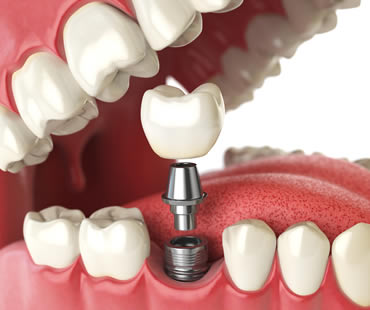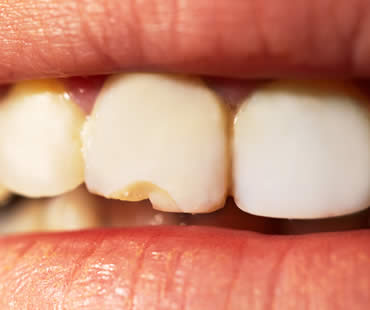
by Dr. Adkins | Jan 27, 2023 | Blog, Dental Topics 1, Implant Dentistry
Losing teeth for one reason or another is not as uncommon as you might think. Injuries and severe tooth decay are only a couple of the causes for smiles to have holes in them from missing teeth. The good news is that you don’t have to go through life with an incomplete smile. Dental implants provide one solution for replacing lost teeth.
Popularity
These restorations that involve a titanium root with an artificial tooth on top have become increasingly popular. Instead of using bridges or dentures that are known to have some hassles with them, implants are a permanent and secure solution. Once the area has healed, you can go back to your normal habits without any concerns related to the implant. They look very natural, preserve neighboring teeth, improve speech, restore the mouth’s function, and help maintain your facial features.
Candidates
Good candidates for implants have strong enough jaw bones to be able to support the implant. Patients with significant bone loss may not be able to successfully maintain implants. Good oral health is helpful, as is good general health since surgery is required. Smokers and those with certain health conditions may not be recommended for dental implants.
Procedure
Once you’ve been identified as a good candidate, the first step is having the titanium rod inserted into your jaw bone. It can take up to three months for it to completely fuse with your bones. Then your dentist will make an abutment to hold the implant, and a mold will be taken of your mouth so that the crown can be created. Until it is ready, a temporary crown will be placed. Finally, your crown will be placed and adjustments will be made if needed.
Maintenance
After you implant is complete, you can resume your regular lifestyle. Your normal dental hygiene routine of brushing, flossing, and checkups should be maintained for the best results.
We offer dental implants at our McDonough dental office.

by Dr. Adkins | Jan 20, 2023 | Blog, Dental Topics 1, Implant Dentistry
Missing teeth can put a damper on your active lifestyle. You may feel self-conscious about your appearance, experience limitations in diet, or have difficulty speaking. Without a full set of teeth, you risk gum degeneration, bone loss, and other oral health problems. Designed to mimic the look and feel of natural teeth, dental implants can rejuvenate your smile.
What is a dental implant?
A small titanium post that serves as an artificial tooth root, a dental implant is surgically positioned into your gums. Your dentist will place a permanent crown on each implant, which completes the replacement tooth. Implants can be used for one or more missing teeth.
Am I a candidate for dental implants?
In general, anyone with a missing tooth should consider dental implants. The key to successful implant placement is good oral health and sufficient bone structure to support the posts. If you don’t have adequate bone levels, your dentist may recommend a bone graft to correct that situation.
How long does the procedure take?
Receiving dental implants is a two-step process. During the first visit, a trained specialist will surgically implant the posts into your jawbone. Then, you will need to wait three to six months for healing and integration with the jawbone. Once this occurs, your dentist will place the permanent crowns on the implants, giving you a full smile.
How do I care for my implants?
Just like your natural teeth, your implants require daily care. Brush often and floss frequently. Regular dental checkups are also important, so schedule visits at least twice a year.
Schedule your appointment at our McDonough dental office

by Dr. Adkins | Jan 13, 2023 | Blog, Dental Topics 2, General Dentistry
When you have a tooth or multiple teeth with extensive damage, your dentist may recommend a crown or bridge to restore your smile. Most of the time these restorations provide complete and successful results, but occasionally problems arise.
Tooth decay:
Good hygiene is imperative after a crown or bridge because plaque can build up in the area where the tooth and crown meet. Your crown can’t decay, but your tooth still can. Follow your dentist’s instructions for proper brushing, flossing, and fluoride use.
Gum disease:
Plaque buildup around a crown can cause gum disease called gingivitis, and if untreated advance to periodontitis.
Chipping or breaking:
Crowns and bridges are susceptible to damage like fracturing or chipping. Many crowns are made of porcelain, which can chip or completely fail. Heavy wear or stress such as teeth grinding can cause this type of damage, as well as an accident like hitting your restoration. Small chips may be repaired with composite filling, but larger damage can mean total replacement.
Incorrect color:
When having your crown or bridge made, you can choose from a selection of colors. However, the whitest shade is not advised because it likely won’t match the rest of your smile or it can look fake. Make sure you consider the color carefully or else you’ll be faced with redoing the restoration if you dislike it.
Falling out:
Several problems can cause your crown to fall out. The core may fail so that the interior portion of your crown is unable to provide a strong base for the restoration. Less likely, the cement can fail so that the crown simply needs stronger adhesion. Or, the post crown can dislodge so that you’ll see a large post sticking out of your crown. If your crown falls out, be sure to save it for your dentist in case it can be reinserted.
In most circumstances, these problems with your crown or bridge do not occur and you can enjoy a long lifespan with your restoration. If you do notice any of these issues, schedule an appointment with your dentist to ensure optimum oral health.
Our dental office is located in McDonough

by Dr. Adkins | Jan 6, 2023 | Blog, Dental Topics 2, Implant Dentistry
Some patients wonder if dental implants are the best choice for their missing teeth. The time and effort dental implants take can be off-putting to some patients. If you’re wondering if dental implants are really worth it, there are many factors for you to consider.
Dental implant treatment takes a relatively long period of time to complete as well as to completely heal when compared to other tooth replacement options, such as a bridge. The planning process is far more involved than in other missing tooth replacement plans. The materials utilized with dental implants take more time to create in a dental lab and require greater skill and attention than other lab-created tooth replacements.
Dental implants are much stronger than other tooth replacement options, and will last years or even decades longer. When compared to a dental bridge which lasts an average of 14 years, a dental implant can last up to 30 years.
Sometimes, if insufficient bone is present to provide the necessary support for the implant, bone from elsewhere in the body might be grafted onto the existing bone. A dental implant must heal completely before any pressure is put on the new artificial tooth roots. This can take up to three months. After this time, the tooth portion of the dental implant is applied.
Dental implants are the strongest, best choice for a patient with a missing tooth. They rarely fracture and never decay. As opposed to a dental bridge that necessitates the removal of some of your natural tooth structure, a dental implant preserves adjacent teeth and allows patients the most natural, ideal choice for tooth replacement.
Dental implant candidates who are willing to be patient and plan for the future can experience the benefits these restorations have to offer. Talk to your dentist if you want to explore your options for replacing one or more missing teeth.
We treat patients from McDonough and the surrounding area

by Dr. Adkins | Dec 30, 2022 | Blog, Dental Topics 2, Family Dentistry
Family dentists can do so much for you and your family. A family dentist is able to perform any other task another dentist can do, but they’re able to perform them on your entire family. The convenience of this service to each member of your family will save you time and trouble. Your family dentist obtains everyone’s complete dental histories, and gives the best treatment possible based on an experienced review of those records.
Because a family dentist recognizes that your time is very valuable, appointments can often be made in blocks so that services can be offered to each member of your family on the same day, near the same time. You can make one trip and be finished with your routine dental checkups, x-rays, cleanings and preventative care for six more months!
Family dental offices also offer cosmetic dentistry services like teeth whitening or porcelain veneers. Dental crowns, dental bridges, fillings and other bonding work can easily be accomplished there. A family dentist also offers root canal treatments, extractions or emergency care.
Your family dentist wants to be a friend of your family for life. Having a dentist who has seen your children’s teeth through their formative years and into adulthood is of huge benefit to your children. As long as your children remain in the area, they will never have to search for another dentist. They will have formed a trusting and comfortable bond with the family dentist, ensuring that good oral hygiene habits will continue into adulthood, as will routine preventative care.
Sedation dentistry is likely to be offered at your family dentist, especially to any patient with a phobia or other anxiety about dental appointments. Even younger patients can benefit from sedation dentistry, allowing them to calm their bodies and to comply with requests by the dentist, keeping everyone safe during treatment.
You are the priority to your family dentist. The relationship that is formed with you and your family is one that your family dentist wants to see last a lifetime.
Schedule your appointment at our McDonough dental office







 770-957-5214
770-957-5214  E-Mail Us
E-Mail Us 
